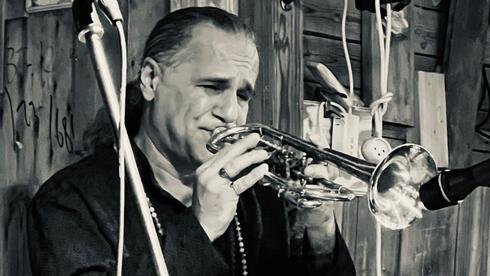How does an Iranian who has spent decades in Israel feel about his journey? Amir Shahsar, a virtuoso musician who fled Iran in 1989, offers a glimpse.
Shahsar is a member of The Diwan Project, an ensemble that brings together musicians and singers under the leadership of Gil Ron Shemer—co-founder of the band Sheva and later creator of several groups merging ethnic and world music—and Alon Amnu Campino. Other members include Dvir Cohen, Liat Zion, Rani Lorenz and Yair Tzabari.
Since its founding in 2003, the group has combined liturgical poetry, Yemenite singing, African rhythms and original compositions for Jewish prayers. Next week (Aug. 27), the ensemble will perform at the Klezmer Festival in Safed, returning after last year’s cancellation due to Hezbollah rocket fire.
“My journey from Iran through Turkey to Israel was a rescue,” Shahsar recalls. “Iran grew darker. Clouds of religion and cultural repression closed in. The harsh reality forced me to leave. I found my way to Turkey, where I established myself as a musician until I met key figures in the Israeli music scene, especially those in Mizrahi music, and eventually emigrated to Israel. The early years were challenging. I aimed for musical excellence like in Iran and Turkey.
At first, I encountered the Persian-Israeli wedding and event scene, which I didn’t enjoy, thinking it represented Israeli culture. Slowly, I connected with ensembles performing higher-quality, ethnically fused music, blending world music and jazz. I met musicians who spoke to me on equal terms, and I recognized a trend in Israeli music from the ’90s to today toward sophisticated fusion. Now, I perform with talented young musicians who were once my students. I see a future for stylish, contemporary Mizrahi music in Israel, and I love being part of it.”
Asked about the global world music scene, Shahsar said: “World music, everywhere—Europe, Israel, other places I’ve performed—has many facets. As a classically trained musician, I play Western classical flute and classical Middle Eastern music, Persian, Arabic and Turkish. Some of this is superficial, but I gravitate toward deeper, spiritual expressions. The scales and improvisations allow me to expand and express myself with other musicians at the highest level.”
In Israel, he adds, the world music scene resembles jazz. “There are master musicians like Zohar Fresco, Idan Armony, Peretz Eliyahu, Yochai Barak and many more with international careers. I collaborate with them as equals, innovating together. I am deeply connected to my 20-year journey with Diwan HaLev, performing ancient Hebrew music and connecting, as an immigrant from Iran, to a different culture with Muslim and Zoroastrian roots. Performing sacred music this way enriches my experience here in Israel.”
Shahsar reflects on the October 7 Hamas terror attack and ongoing tensions: “Regarding the war, I prefer not to comment. I fled my homeland, and I deeply miss the Persian culture that existed before darkness took over. I am at peace here, though the situation can be difficult, like the issue of hostages. I stay away from politics and current events, focusing instead on mythology, mysticism, anthropology and listening to the great Persian and Azeri musicians. I avoid daily distractions that lead to despair.”
What can audiences expect at the Klezmer Festival in Safed?
“Part of Diwan HaLev’s performance is a spiritual, contemporary journey through liturgical poetry from diverse Jewish communities, accompanied by ethnic instruments in innovative arrangements. For me, the Diwan is a spiritual space—it’s like my synagogue, like a mosque I don’t have. My religion is music…and nurishment.”




